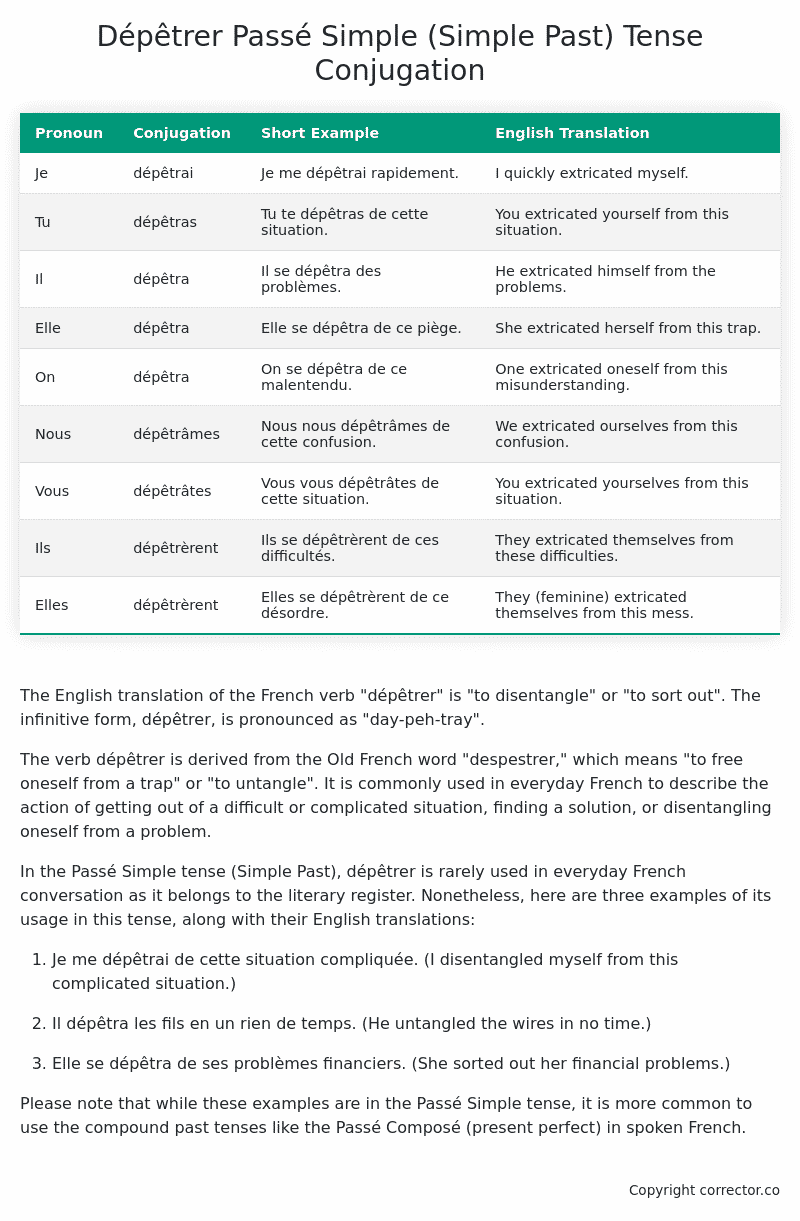Passé Simple (Simple Past) Tense Conjugation of the French Verb dépêtrer
Introduction to the verb dépêtrer
The English translation of the French verb “dépêtrer” is “to disentangle” or “to sort out”. The infinitive form, dépêtrer, is pronounced as “day-peh-tray”.
The verb dépêtrer is derived from the Old French word “despestrer,” which means “to free oneself from a trap” or “to untangle”. It is commonly used in everyday French to describe the action of getting out of a difficult or complicated situation, finding a solution, or disentangling oneself from a problem.
In the Passé Simple tense (Simple Past), dépêtrer is rarely used in everyday French conversation as it belongs to the literary register. Nonetheless, here are three examples of its usage in this tense, along with their English translations:
-
Je me dépêtrai de cette situation compliquée.
(I disentangled myself from this complicated situation.) -
Il dépêtra les fils en un rien de temps.
(He untangled the wires in no time.) -
Elle se dépêtra de ses problèmes financiers.
(She sorted out her financial problems.)
Please note that while these examples are in the Passé Simple tense, it is more common to use the compound past tenses like the Passé Composé (present perfect) in spoken French.
Table of the Passé Simple (Simple Past) Tense Conjugation of dépêtrer
| Pronoun | Conjugation | Short Example | English Translation |
|---|---|---|---|
| Je | dépêtrai | Je me dépêtrai rapidement. | I quickly extricated myself. |
| Tu | dépêtras | Tu te dépêtras de cette situation. | You extricated yourself from this situation. |
| Il | dépêtra | Il se dépêtra des problèmes. | He extricated himself from the problems. |
| Elle | dépêtra | Elle se dépêtra de ce piège. | She extricated herself from this trap. |
| On | dépêtra | On se dépêtra de ce malentendu. | One extricated oneself from this misunderstanding. |
| Nous | dépêtrâmes | Nous nous dépêtrâmes de cette confusion. | We extricated ourselves from this confusion. |
| Vous | dépêtrâtes | Vous vous dépêtrâtes de cette situation. | You extricated yourselves from this situation. |
| Ils | dépêtrèrent | Ils se dépêtrèrent de ces difficultés. | They extricated themselves from these difficulties. |
| Elles | dépêtrèrent | Elles se dépêtrèrent de ce désordre. | They (feminine) extricated themselves from this mess. |
Other Conjugations for Dépêtrer.
Le Present (Present Tense) Conjugation of the French Verb dépêtrer
Imparfait (Imperfect) Tense Conjugation of the French Verb dépêtrer
Passé Simple (Simple Past) Tense Conjugation of the French Verb dépêtrer (You’re reading it right now!)
Passé Composé (Present Perfect) Tense Conjugation of the French Verb dépêtrer
Futur Simple (Simple Future) Tense Conjugation of the French Verb dépêtrer
Futur Proche (Near Future) Tense Conjugation of the French Verb dépêtrer
Plus-que-parfait (Pluperfect) Tense Conjugation of the French Verb dépêtrer
Passé Antérieur (Past Anterior) Tense Conjugation of the French Verb dépêtrer
Futur Antérieur (Future Anterior) Tense Conjugation of the French Verb dépêtrer
Subjonctif Présent (Subjunctive Present) Tense Conjugation of the French Verb dépêtrer
Subjonctif Passé (Subjunctive Past) Tense Conjugation of the French Verb dépêtrer
Subjonctif Imparfait (Subjunctive Imperfect) Tense Conjugation of the French Verb dépêtrer
Subjonctif Plus-que-parfait (Subjunctive Pluperfect) Tense Conjugation of the French Verb dépêtrer
Conditionnel Présent (Conditional Present) Tense Conjugation of the French Verb dépêtrer
Conditionnel Passé (Conditional Past) Tense Conjugation of the French Verb dépêtrer
Conditionnel Passé II (Conditional Past II) Tense Conjugation of the French Verb dépêtrer
L’impératif Présent (Imperative Present) Tense Conjugation of the French Verb dépêtrer
L’impératif Passé (Imperative Past) Tense Conjugation of the French Verb dépêtrer
L’infinitif Présent (Infinitive Present) Tense Conjugation of the French Verb dépêtrer
L’infinitif Passé (Infinitive Past) Tense Conjugation of the French Verb dépêtrer
Le Participe Présent (Present Participle) Tense Conjugation of the French Verb dépêtrer
Le Participe Passé (Past Participle) Tense Conjugation of the French Verb dépêtrer
Struggling with French verbs or the language in general? Why not use our free French Grammar Checker – no registration required!
Get a FREE Download Study Sheet of this Conjugation 🔥
Simply right click the image below, click “save image” and get your free reference for the dépêtrer Passé Simple tense conjugation!

Dépêtrer – About the French Passé Simple (Simple Past) Tense
Formation
Usage
Narration
Historical Context
Interactions with other tenses
Passé Composé
Imparfait
Conditional and Subjunctive
Summary
I hope you enjoyed this article on the verb dépêtrer. Still in a learning mood? Check out another TOTALLY random French verb conjugation!


